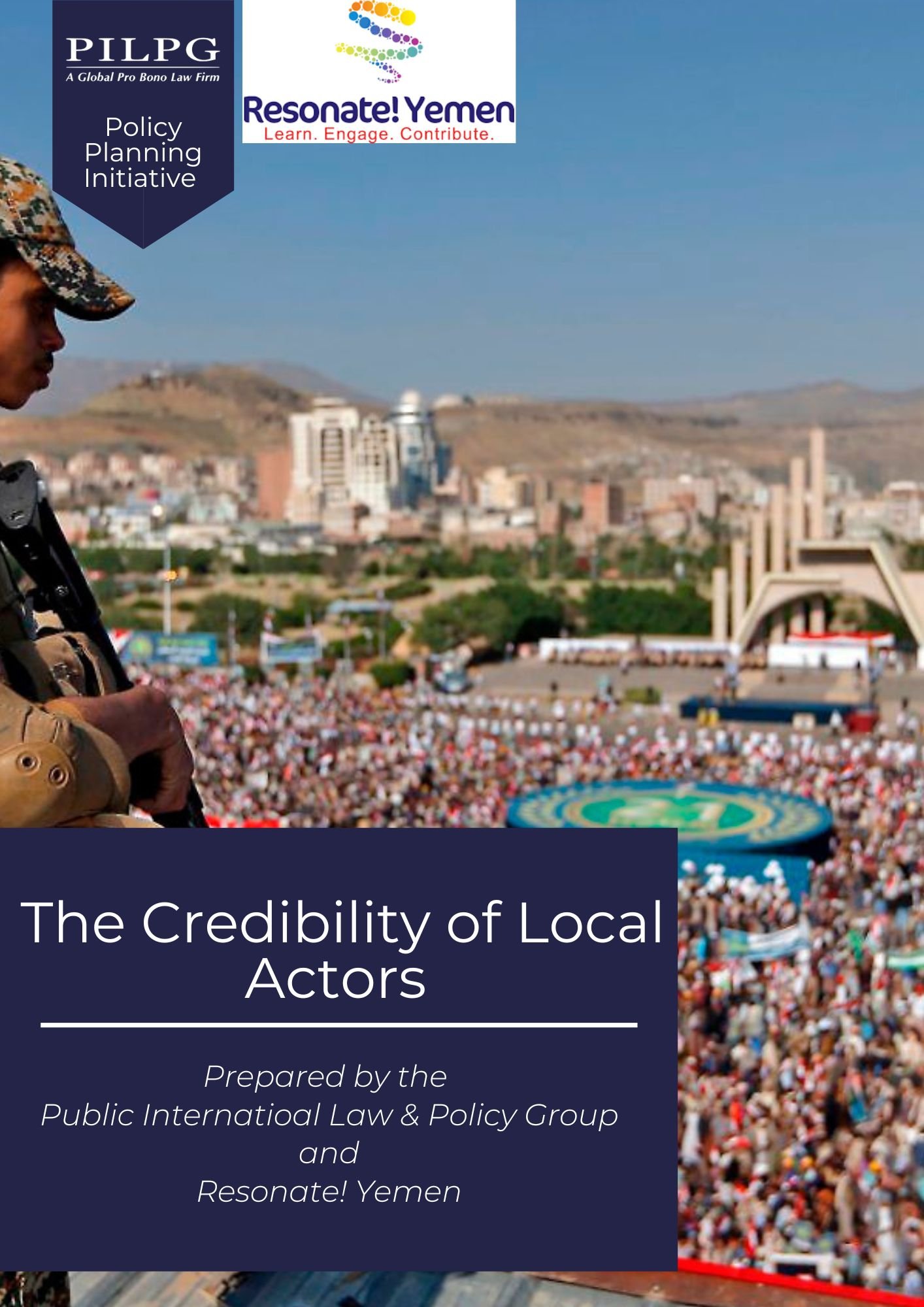Policy Planning White Paper:
The Credibility of Local Actors
Statement of Purpose
This white paper analyzes Yemeni public perspectives on the credibility of political actors in governorates under the jurisdiction of the internationally recognized Yemeni government. It employs trust, public acceptance, and the belief that the party or actor represents Yemenis, including in peace negotiations as indicators of credibility. Relevant research questions include public perception of political actors; changes in perceptions of credibility over time; and preferences regarding how the war should end.
Executive Summary
The purpose of this White Paper is to analyze Yemeni public perspectives on the credibility of political actors in governorates under the jurisdiction of the internationally recognized Yemeni government.
As the war in Yemen enters its seventh year the impact on Yemeni citizens is increasingly dire. Shuttle peace talks mediated by UN Special Envoys between the Republic of Yemen Government (ROYG) and Ansar Allah 1 have failed, and the implementation of the Riyadh Agreement between the ROYG and the Southern Transitional Council (STC) has been only implemented in part. The economy and standard of living of Yemeni citizens has continuously deteriorated, and has been further exacerbated since 2020 by the COVID-19 pandemic. The United Nations estimates that in 2022, 75% of Yemenis will require some form of humanitarian assistance. Further, dynamics between political actors have continued to shift, most recently with the transfer of presidential power in the ROYG from President Hadi to an eight person Presidential Leadership Council (PLC). This has raised the Yemeni public’s hopes that it will be possible to end the war, while, paradoxically, Yemeni political actors’ credibility has decreased.
This analysis draws on the relevant portions of three years of data collection, including quantitative surveys, focus group discussions, and qualitative interviews with Yemenis living in areas under the control of the internationally recognized government (see Annex I for an overview of methods). Indicators of “credibility” include trust, public acceptance, and the belief that the party or actor represents the Yemeni public interest, including in peace negotiations.
Over 80% of respondents, interviewees and focus group participants across all three phases indicated a preference for political parties to reach a negotiated settlement, rather than waiting for one actor to achieve a decisive military victory. However, what is less clear is how to achieve this in light of the low confidence expressed with the current slate of political actors.
The conflict is no longer confined to the ROYG (often referred to as the “legitimate government”) and the Houthis. Numerous armed groups with foreign support have played an important role in the trajectory of the war by aligning themselves with parties or factions within parties. Multiple parties have developed in southern Yemen.
Yemenis are frustrated by the ever-changing geographical divisions and conflict parties’ inability to reach and maintain a peace agreement. Despite this complicated political context the data indicates the Yemeni public views only the Houthis, the ROYG, and the STC as the main Yemeni conflict actors, with some recognition of the role of regional and international parties.
In an open-ended question about credible actors, the ROYG was most commonly mentioned (52%), followed by the STC (14%), and Ansar Allah (1%). As discussed below, only 39% of quantitative survey respondents felt public acceptance of the ROYG had increased; this support varies across governorates. Uneven public support for the ROYG may be further affected by the recent transfer of presidential power to the PLC. Significantly, nearly a third of interviewees (28%) in 2021 reported there were no credible actors involved in peace negotiations. Many reported concerns that these actors actually sought to prolong the conflict for economic gain and political advantage.
Recommendations for local and international actors to bolster their credibility and reach a peaceful conclusion include:
● Engage with the PLC and other credible actors to facilitate peace and humanitarian relief throughout Yemen;
● Advocate for inclusion of women, youth and civil society organizations in peace negotiations;
● Conduct long term research on the perceived credibility of political actors including the new leadership council of the Republic of Yemen Government;
● Facilitate dialogue where useful, and build capacity through training and aid.
About PILPG’s Policy Planning Initiative
PILPG’s Policy Planning Initiative supports the development of long term, strategic policy planning that is crucial to international accountability, global conflict resolution, and the establishment of international peace. The Initiative provides timely and accurate policy planning analysis and work product on pressing and future policy conundrums by leveraging PILPG’s deep network of talent within the international legal and policy communities and experience with its pro bono clients globally. PILPG Policy Planning focuses on advising policymakers, policy shapers, and engaged stakeholders on pressing issues within the arenas of international law, war crimes prosecution, and conflict resolution efforts. This includes identifying and addressing gaps within existing policies, anticipating key conundrums and questions that will riddle future policy decisions, applying lessons learned from comparative state practice, and proactively producing and sharing work product to inform such policies and avoid crisis decision making.
About PILPG
The Public International Law & Policy Group is a global pro bono law firm providing free legal assistance to parties involved in peace negotiations, drafting post-conflict constitutions, and war crimes prosecution/transitional justice. To facilitate the utilization of this legal assistance, PILPG also provides policy planning assistance and training on matters related to conflict resolution.
Since its founding in 1995, PILPG has provided legal assistance to over two dozen peace negotiations, and over two dozen post-conflict constitutions, and has assisted every international and hybrid criminal tribunal, as well as helped to create a number of domestic transitional justice mechanisms. PILPG represents a diverse array of pro bono clients including states, sub-state actors, opposition groups, self-determination movements, civil society, and marginalized actors, including women and youth.


